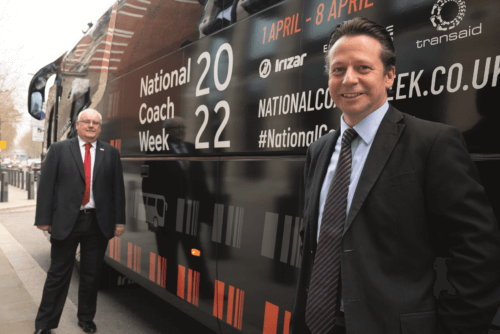
The first National Coach Week took place from 1 April, marking the importance of coaches across the country. Jonathan Welch spoke to the organisers to find out more
National Lorry Week has been part of the haulage and logistics industry’s calendar for a number of years, and now the coach industry has a similar week-long spotlight with the launch of National Coach Week. Orchestrated by the RHA, in partnership with Backhouse Jones, Transaid and Irizar and with the support of the CPT and UKCOA, the National Coach Week tour kicked off in the south of England on Friday 1 April, visiting Wales, the north-west and north east, and venturing into Scotland before heading for the UK Coach Rally at Blackpool on the weekend of 9/10 April.
With its own dedicated website at nationalcoachweek.co.uk, the event marked a time to reboot British tourism and an opportunity for operators and tourist destinations to relaunch their offering into the market as it emerges from two years of hiatus.
The specially-liveried Irizar i6S Integral coach visited Westminster ahead of the event, before going on to visit key coach tourism destinations and engage with politicians, stakeholders, and national, local, and specialist media, and the general public along the way.
Launching the event, RHA Managing Director Richard Smith said: “We’re excited to be launching the UK’s first-ever National Coach Week and we’re encouraging everyone to get involved. Coaches play a vital role, taking us on school trips, to festivals, holiday destinations and football matches, but are often overlooked and under-appreciated. We hope that people will get a better understanding of why coaches are so important. People in our industry have shown great resilience over the last couple of years in the face of huge challenges. National Coach Week is our opportunity to celebrate them and the great work they do.”
[…]
By subscribing you will benefit from:
- Operator & Supplier Profiles
- Face-to-Face Interviews
- Lastest News
- Test Drives and Reviews
- Legal Updates
- Route Focus
- Industry Insider Opinions
- Passenger Perspective
- Vehicle Launches
- and much more!


